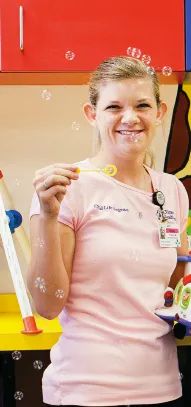
Somebody's Hero
Kristy Adams, Child Life Specialist at St. Vincent Healthcare
By Jamie Besel
Nobody expects a family member, or a child for that matter, to become sick-so ill they need to be hospitalized. This can be an extremely stressful time for all involved-from the littlest patients to the grown-ups; a time when it seems like there are more questions than answers. Here to help children and their families cope with the stress and uncertainty of illness, injury and hospitalization is Kristy Adams, a Child Life Specialist for the Child Life Program at St. Vincent Healthcare. And unlike other healthcare professionals at St. Vincent Healthcare, one of Kristy’s tools of the trade is bubbles-and lots of them.
- What is a Child Life Specialist?
I’m a child development expert who works with children and their families to help keep things as normal as possible during a hospitalization. I provide all sorts of education to the child and the family before a procedure such as a CT, MRI, surgery or IV start. I also provide distraction during such procedures to help keep the child’s mind on something else other than the procedure. Although I primarily work on the Pediatric Unit, I occasionally visit children on the other floors in the hospital. For example, I go visit with children whose dad is in the Intensive Care Unit and describe what is going on.
- Has a career as a Child Life Specialist always interested you?
I always knew I wanted to work with children, even from an early age, although I wasn’t sure in what capacity. When I was younger, I had a friend who had childhood cancer. Watching her go through everything made me want to help people in some way. In my current position I have the privilege to work with kids, helping them out during a stressful time, and hopefully making it as positive an experience as it can be.
- What do you enjoy most about your job?
I’m the “fun person” in the hospital. Aside from the teaching I provide, I get to play with kids and keep their minds off of some pretty tough stuff. To a child, I’m different from a parent, a nurse or even the doctor. I get to add that extra element to the care of a child.
- What amazes you about children?
Children have this amazing ability to see the positive even in a terrible situation. They may not understand the full extent and gravity of the situation, but somehow they focus on some positive aspect and usually end up lightening the mood.
- What was an extra special moment you shared with a child?
There was a young patient on the Pediatric Unit, 3 or 4 years old, who needed her blood drawn on a daily basis-something that was very hard for her. One day, to keep her mind off the painful procedure, I decided to start singing. Three of the four nurses in the room helping to hold her arms and legs still started singing, too. The girl, realizing the fourth nurse who was drawing the blood sample wasn’t singing, promptly pointed at her and told her to start singing too. We couldn’t help but laugh. Here the girl was receiving a painful blood draw, but all she could think about was getting the other nurse to sing along. It made our day a little brighter!
- What are 3 things you keep in your purse-always?
The pockets of my purse are always full of stuff. Right now I could pull out my key chains, mini play dough and stickers-all of which I can use as a quick distraction for a child. You never know when you might run in to a child who needs a little distraction from something. Like in the line at the grocery store!
- I understand you enjoy the outdoors. What are some of your favorite outdoor activities?
I enjoy softball, hiking, rafting and snowboarding. Although coming from Minnesota, where there are more hills than mountains like in Montana, I need to work on my snowboarding skills!
- Why is play so important to a child, especially during their time in the hospital?
It’s really about the distraction. It is keeping their minds off of a lot of things that aren’t so fun, if only for a short time.
- I understand you have a closet tucked away on the Pediatric Unit play room full of fun activities. What are some things a kid can expect to find?
I have all sorts of fun stuff for kids to play with! There are books, art supplies, crafts and a portable Wii player to name a few. And we can’t forget about the cute little teddy bears I give to patients!
- Do you have any advice you’d like to share with parents?
I think the most important thing for parents to remember is that kids are smart. They need, and want, to be included. This is true even if the parent is the patient, the child is receiving treatment or even for the siblings on the sidelines. Kids have amazing imaginations that can easily run wild-what they wonder is a lot worse than reality. Ultimately, it’s best to let the child in on what is going on. You don’t need to share extensive details, just enough to keep them informed and feeling like they are a part of what is going on.
